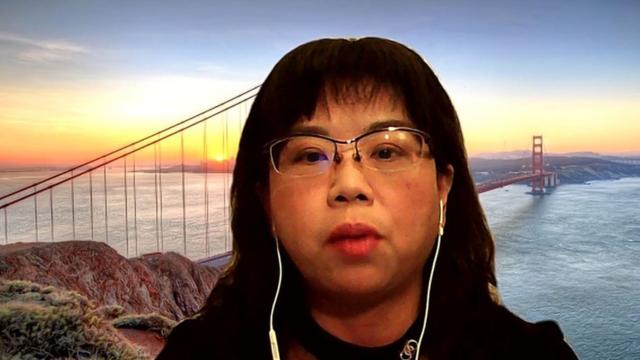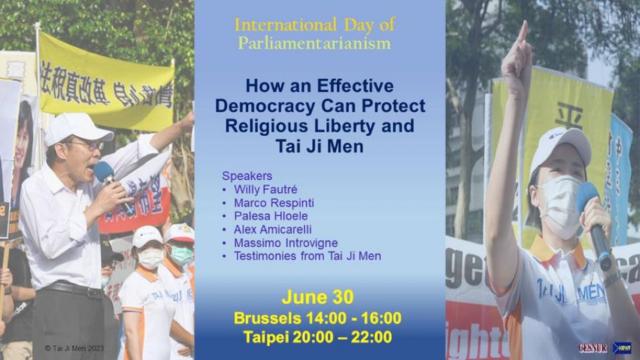On the International Day of Parliamentarianism, international experts discussed how a genuine parliamentary democracy should guarantee both religious liberty and tax justice.
by Daniela Bovolenta

“How an Effective Democracy Can Protect Religious Liberty and Tai Ji Men” was the title of yet another of the bi-monthly webinars on the Tai Ji Men case co-organized by CESNUR and the Brussels-based NGO Human Rights Without Frontiers. It was held on June 30, 2023, the United Nations International Day of Parliamentarianism.
Willy Fautré, co-founder and director of Human Rights Without Frontiers, introduced the webinar. He insisted that freedom of religion or belief (FoRB) should never be relegated to the role of a secondary human right, while in fact it is the cornerstone of democracy and genuine parliamentarianism. Various forms of extremism, Fautré said, weaponize the role of majority religions or ideologies to oppress minorities. On the other hand, Fautré concluded, only governments that protect FoRB can also protect effectively other human rights, a lesson on which the Taiwanese government should reflect when dealing with the Tai Ji Men case.
Fautré then presented a video on the recent trip of Tai Ji Men dizi to Vilnius, Lithuania, where they attended the 2023 CESNUR conference. The video showed a martial arts performance by one of the dizi in Vilnius’ main square, illustrating the traditional song “The Swordsman.”

Fautré then introduced the first two speakers, Marco Respinti, an Italian journalist and scholar who serves as director-in-charge of Bitter Winter, and Palesa Hloele, a South African researcher from Johannesburg’s African Hidden Voices Research Institute.
Respinti quoted British politician Winston Churchill, French political thinker Alexis de Tocqueville, and American political theorist John C. Calhoun. All acknowledged democracy as the best possible condition for the exercise of political power. At the same time, all warned about the risk that democracy can degenerate into “the tyranny of the majority,” and devised various provisions to protect minorities.
Religious and spiritual minorities, Respinti said, are particularly in danger. The Tai Ji Men case demonstrates that they can be harassed and persecuted, including through fabricated tax bills, even in a democratic regime. Only by solving the Tai Ji Men case, Respinti concluded, “Taiwan may aspire to truly become a government of the people, by the people, for the people,” according to Abraham Lincoln’s famous definition of democracy.
Palesa Hloele observed that South Africa and Taiwan share the fact that they had to go, in comparatively recent times, through the transition from an authoritarian to a democratic regime. The South African experience, Hloele said, proves that FoRB is one of the most difficult rights to guarantee during such transitions. In South Africa, laws against “hate speech” limits the rights of religions to proclaim their doctrines when they conflict with the ideas of the majority. Governmental commissions investigate the supposed “harm” done by minority forms of religion and spirituality and create discrimination.

Taiwan has experienced similar problems, Hloele said. During the June 2023 CESNUR conference in Vilnius, she met Tai Ji Men dizi (disciples) and learned about their problems in Taiwan. She was moved by their testimonies, and she found the situation in Taiwan very similar to South Africa. When a country transitions to democracy, there is always the risk that FoRB remains behind. Yet, FoRB is essential for democracy, she concluded, something that scholars from all over the world who support Tai Ji Men keep repeating to Taiwan’s government.
Alessandro Amicarelli, a London-based human rights attorney and the President of the European Federation for Freedom of Belief (FOB), chaired the second session of the webinar. He noted that, although Taiwan is not a member of the United Nations, it has incorporated the UN Two Covenants on human rights into its domestic legislation in 2009. The Tai Ji Men case, however, seems to indicate that their provisions about both FoRB and taxpayer’s rights are not respected.
The full video of the webinar.
Amicarelli presented a video about Tai Ji Men’s performances and international efforts for peace and love, and the acknowledgements the movement and its leader, Dr. Hong Tao-Tze, received both in the United States and from four Presidents of Taiwan. He then introduced the testimonies of five dizi.
Cindy Wang, a graduate student, reported how she overcame her natural shyness through the practice of qigong and self-cultivation in Tai Ji Men, and now often speaks in public. She noted that parliamentarianism requires to be constantly updated to be effective, and parliaments should ask themselves whether they are fully performing their constitutional roles. In Taiwan, the Legislative Yuan is supposed to supervise the activities of the government. However, it never succeeded in controlling or eliminating the immoral bonus system for tax bureaucrats, which is one of the root causes of tax injustice in Taiwan. Wang also called her fellow students, who now can vote in Taiwan from the age of 18, to take seriously their right and duty to participate in the elections, and look for candidates defending human rights and advocating for tax reform.

Vicky Cheng, a project manager in an electronic industry, celebrated the International Day of Parliamentarianism as a day when we are all called to reflect on democracy and our political duties. She took inspiration from her father, who was also personally a victim of tax injustice and, after he had joined Tai Ji Men, used his spare time to visit cities and even remote villages in Taiwan advocating for tax reform. She does the same, calling not only for justice for Tai Ji Men but for an in-depth reform that would allow individual and companies to flourish in Taiwan without being harassed and scared by ill-founded actions by tax bureaucrats.

Gene Wang, who works as a process manager in a medical device company, discussed the primacy of conscience taught by Tai Ji Men and how he tries to apply this principle in his work, which directly affects human health. Wang recalled the core of the Tai Ji Men tax case, the National Taxation Bureau’s insistence in enforcing an ill-founded tax bill for the year 1992, claiming that a corresponding court decision had become final and the five-year term to apply for retrial had passed. For all the other years, the unfounded tax bills against Tai Ji Men have been corrected to zero, in accordance with the Supreme Court’s decision of 2007 stating that Tai Ji Men had never been guilty of tax evasion. For the case of 1992, which is in its essence not different from the others, the only argument of the National Taxation Bureau is the technical one that the five-year term has expired. However, Wang said, “justice should not have a time limit.” Laws should be amended and allow for retrial at any time when new facts or new evidence emerge.

Jenny Lin, a civil servant, reported how practicing qigong at Tai Ji Men solved her problems of infertility. She became a mother, and experiencing the mother-child relationship taught her to put the primacy of conscience and the principle of “listen first” into practice. These principles were obviously not applied by the bureaucrats who handled the Tai Ji Men case, Lin said. She became very passionate about tax reform, Lin reported, and has visited several towns advocating for a fairer tax system, which would also allow for a just solution of the Tai Ji Men case.

Catherine Hsieh, a young student, noted that the selection of June 30 as the International Day of Parliamentarianism commemorates the founding of the Inter-Parliamentary Union in 1889. After more than one hundred years, progress has been achieved but parliamentarianism still does not fully guarantee human rights. When she looks at the Tai Ji Men case, Hsieh said, she feels quite pessimistic about the state of democracy in Taiwan. However, she tries not to lose hope and continues the fight for justice, encouraged by international support.

Massimo Introvigne, the managing director of CESNUR and the editor-in-chief of Bitter Winter offered the conclusions of the webinar. He emphasized that democracy needs both FoRB and tax justice to effectively function. The Roman Empire was not a democracy, he said, but one of the secrets of its effectiveness was that at the local level cities and colonies were administered by semi-democratic assemblies, whose members were called decurions. They also collected taxes but tried to protect the interests of local taxpayers against the central government. In the 3rd century CE, the Roman Empire entered into a serious tax crisis, and wrongly reacted through tax increase rather than tax reform. Decurions were compelled to pay from their own pockets what was missing in their cities’ tax quotas, and when they refused or were not able to do it, they were imprisoned or even executed.
By the 5th century, the system had become untenable, and the Roman Empire itself came to an end. “The Roman Empire, Introvigne commented, weakened by tax injustice, fell when aggressive neighbors decided to attack and put an end to it. If I were a Taiwanese politician, I would wonder whether there is not a risk that this ancient story may repeat itself in modern Taiwan.”

The webinar concluded with a video explaining in scientific terms the benefits of qigong as taught by Tai Ji Men for both physical and mental health.
Source: Bitter Winter

